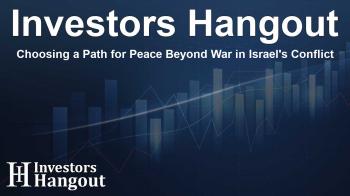Choosing a Path for Peace Beyond War in Israel's Conflict

Urgent Appeal for Peace in the Midst of Conflict
In times of conflict, it's essential to reflect on the words of wise leaders who have guided us through challenging times. Before his death, Moses urged our people to prioritize life for the sake of future generations, reminding us of the importance of choosing paths that uplift and protect those we love.
Currently, Israel is faced with challenging decisions regarding its ongoing war against Hamas. We strongly urge Israeli leaders to choose life, not only for the hostages and soldiers but for innocent civilians caught in the crossfire. This conflict is not merely about military strategies; it's a plea for humanity and compassion in a devastating situation.
Concerns Over Military Expansion
The recent decision by Israel's security cabinet to extend control over the Gaza Strip raises significant concerns. As individuals who believe in a safe and ethical Israel, we stand with those who caution against further occupation of this area. Prominent Israeli military and political figures, along with many citizens, are voicing their concerns that expanding control could lead to catastrophic consequences.
In the past two years alone, countless lives have been lost, and many have endured unimaginable suffering. The majority of voices within Israel, including respected leaders and advocates, warn that continuing occupation is a path fraught with danger. These concerns are echoed by influential media voices who describe any attempts to re-occupy as a monumental error. The specter of past military entanglements looms large, reminding us of the failures of previous occupations.
Human and Economic Costs of the Conflict
The tragic extension of this war not only jeopardizes lives but further burdens IDF soldiers who are already facing physical and mental exhaustion. Civilians in Gaza find themselves more than merely collateral damage; they are individuals grappling with the consequences of a prolonged conflict. Economic instability and societal divisions in Israel must also be acknowledged, as prolonged warfare threatens to isolate the nation from vital international support.
Prime Minister Netanyahu's reassurances that current measures are temporary evoke skepticism. Recent history shows that such assurances often lead to extended conflicts rather than resolutions. Without an exit strategy or a plan for post-conflict recovery, the risks continue to escalate.
The Global Reaction and Responsibility
Israel’s global reputation and security are at risk due to the ongoing conflict and recent military decisions. As a nation bolstered by international alliances, the shift in global perceptions is critical. Military support from allies could diminish as the realities of the war unfold. The international community's reaction to these developments serves as a reminder that responsible governance must prioritize the well-being of all involved.
The role of Hamas in perpetuating this conflict cannot be overlooked; they hold a significant share of the responsibility for the ongoing crisis. Nevertheless, Israel must recognize its capacity and obligation to safeguard its values by striving to end the war. A focus on ending hostilities is necessary for the future well-being of everyone involved.
Building a Better Future Together
Now is the time for bold actions toward peace rather than further escalation. It is imperative to negotiate not only for the safe return of hostages but also to foster cooperation among Arab nations, the U.S., and other allies, aiming to rebuild Gaza and create a sustainable future. The commitment to peace will require understanding, compassion, and strategic planning.
The leadership of organizations like the Union for Reform Judaism and the Central Conference of American Rabbis underscores the importance of compassion and ethical decision-making in these trying times. With unified voices calling for peace, we should embrace the potential for healing rather than further division.
Frequently Asked Questions
What is the current situation in Israel regarding the conflict?
The conflict between Israel and Hamas has escalated, with recent government decisions to extend control over the Gaza Strip, raising concerns among local and international observers about the potential consequences.
Who are the voices advocating for peace in Israel?
Prominent figures, including military leaders, political experts, and community organizations, are calling for a peaceful resolution to the conflict, emphasizing the importance of prioritizing life and humanitarian efforts.
What are the potential consequences of the war's expansion?
Further military actions could lead to increased loss of life, economic instability, and further societal divisions, both within Israel and with its international allies.
How can Israel ensure a safe future for its citizens?
By choosing to engage in peace negotiations, fostering collaboration with regional partners, and focusing on humanitarian efforts, Israel can work towards a safer and more stable future for all.
What role do international relationships play in the conflict?
Israel's relationships with global allies are crucial for support. Any shift in these relationships due to military actions can significantly impact its security and diplomatic standing.
About The Author
Contact Caleb Price privately here. Or send an email with ATTN: Caleb Price as the subject to contact@investorshangout.com.
About Investors Hangout
Investors Hangout is a leading online stock forum for financial discussion and learning, offering a wide range of free tools and resources. It draws in traders of all levels, who exchange market knowledge, investigate trading tactics, and keep an eye on industry developments in real time. Featuring financial articles, stock message boards, quotes, charts, company profiles, and live news updates. Through cooperative learning and a wealth of informational resources, it helps users from novices creating their first portfolios to experts honing their techniques. Join Investors Hangout today: https://investorshangout.com/
The content of this article is based on factual, publicly available information and does not represent legal, financial, or investment advice. Investors Hangout does not offer financial advice, and the author is not a licensed financial advisor. Consult a qualified advisor before making any financial or investment decisions based on this article. This article should not be considered advice to purchase, sell, or hold any securities or other investments. If any of the material provided here is inaccurate, please contact us for corrections.

